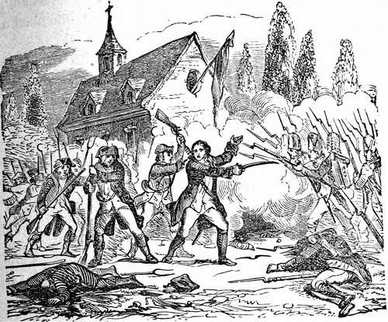Who was Jonas Clark?

Prior to our country's birth, Christian ministers did not just teach the principles that led to independence, they also participated on the battlefield to secure that independence. The most noted of these is Pastor Jonas Clark, who pastored a church in Lexington, Massachusetts.
When Paul Revere set off on his famous ride, it was to the home of the Pastor Clark in Lexington that he rode. Patriot leaders John Hancock and Samuel Adams were lodging with Pastor Clark. After learning of the approaching British forces, Hancock and Adams turned to Pastor Clark and inquired of him whether the people were ready to fight. Clark unhesitatingly replied, "I have trained them for this very hour!" When the original alarm sounded in Lexington to warn of the oncoming British menace, citizens gathered at the town green, and according to early historian Joel Headley:
There they found pastor Clark who had arrived before them. The roll was called and a hundred and fifty answered to their names . . . . The church, the pastor, and his congregation thus standing together in the dim light, waiting for the British soldiers.
The British did not appear at that first alarm, and the people returned home. At the subsequent alarm, they reassembled, and once the sound of the battle subsided, some eighteen Americans lay on Lexington Green; seven were dead - all from the Pastor Clark's church. Headley therefore concluded, "The teachings of the pulpit of Lexington caused the first blow to be struck for American Independence," and historian James Adams added that "the patriotic preaching of the Reverend Jonas Clark primed those guns."
When Paul Revere set off on his famous ride, it was to the home of the Pastor Clark in Lexington that he rode. Patriot leaders John Hancock and Samuel Adams were lodging with Pastor Clark. After learning of the approaching British forces, Hancock and Adams turned to Pastor Clark and inquired of him whether the people were ready to fight. Clark unhesitatingly replied, "I have trained them for this very hour!" When the original alarm sounded in Lexington to warn of the oncoming British menace, citizens gathered at the town green, and according to early historian Joel Headley:
There they found pastor Clark who had arrived before them. The roll was called and a hundred and fifty answered to their names . . . . The church, the pastor, and his congregation thus standing together in the dim light, waiting for the British soldiers.
The British did not appear at that first alarm, and the people returned home. At the subsequent alarm, they reassembled, and once the sound of the battle subsided, some eighteen Americans lay on Lexington Green; seven were dead - all from the Pastor Clark's church. Headley therefore concluded, "The teachings of the pulpit of Lexington caused the first blow to be struck for American Independence," and historian James Adams added that "the patriotic preaching of the Reverend Jonas Clark primed those guns."